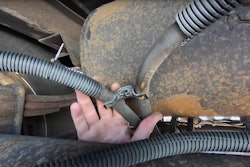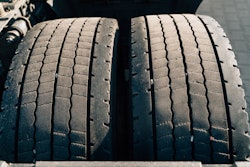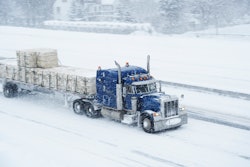Current generation diesel engines have OEM-approved oil drain intervals that can reach 100,000 miles under certain conditions.
Joining Matt and Jason on this week's 10-44 is Joe Puff, vice president of truck technology and maintenance at NationaLease, who offers recommendations for oil and cabin air filters, and more – all of which extend the lives of of the components to which they're attached.
Contents of this video
00:00 Importance of high-quality oil filters02:48 Air filtration
03:38 Best time to change fuel filters
05:51 Overlooked filters on trucks
07:38 Air dryer cartridges
09:39 DEF and DPF filters
Transcript
Jason CannonThis week's 10-44 is brought to you by Chevron Delo 600 ADF ultra low ash diesel engine oil. It's time to kick some ash.
Fleets keep asking more from their truck fluids, but can the corresponding filters really keep up?-Hey everybody. Welcome back to the 10-44, a weekly webisode from the editors here at CCJ. I'm Jason Cannon and my cohost on the other side is Matt Cole. With current generation diesel engines, depending on the duty cycle, we're seeing OEMs approve engine oil drain intervals that start around 50,000 miles and longer for line haul. But that's if you follow a strict set of approved practices and protocols. In some cases, you can push that up to 75,000 and even 100,000 miles
Matt Cole
A generation ago, those drain recommendations were somewhere around 30,000 miles. And there's plenty of fleets and drivers that still think that's the magic number, but just about every fluid on the truck has a corresponding filter. And with so much emphasis placed on extending intervals and saving money and downtime, the filter often is just dragged along for the ride.
Jason Cannon
It stands to reason that the longer an oil filter is screwed onto the engine, the more contaminants that it's going to catch. But it's capacity to filter the oil isn't infinite. So if you're really stretching your engine oil drain interval, Joe Puff, who's Vice President of Truck Technology and Maintenance at National Lease recommends to be certain that the oil filter is up for the challenge.
Joe Puff
The days of using an entry level filter can be problematic today. From the media filtration micron level, to the flow rate bypass pop off valve pressures, to the internal construction. All those things have a great effect on the filters ability to do its job. And today, I strongly recommend to people to use a high quality name brand filter. You really want a filter brand that has a service guarantee and one that doesn't conflict with OEM's spec requirements.
Matt Cole
There's tons of filters available between OEM and aftermarket brands, and they all look mostly the same, but Joe says filtration isn't the place to try and save a couple of dollars.
Joe Puff
But it's incumbent upon the fleet to make sure that they're using a filter that complies with the manufacturer's recommendation. And again, some of those entry level filters or no brand type filters, I'd be real careful of using those today because the damage from a bad filter may not show up for years, a year later. 50, 100,000 miles later. Once the damage starts, you can't go back and fix it.
So I recommend to people to make sure they're using a good quality extended life high brand recognition oil filter. If it's something to do with air filtration, oil filtration, air systems, the air dryer cartridges, that's another thing that people need to be careful of is if they are replacing an air dryer cartridge and they've got a coalescing air dryer cartridge, they need to make sure they're putting another coalescing cartridge on it because you can put just a regular cartridge on that's not oil coalescing and that's problematic. If it comes with a coalescent filter, you should put a replacement coalescing filter on it. Cause you can buy the regular ones for 10 or 15 bucks less. But again, you might save 15 bucks on an air dryer, but if you cost you an automated transmission, you didn't save nothing.
Jason Cannon
There's not really a seasonality when it comes to filtration. Filters need to be changed at a given mileage or hour interval, whether it's 90 degrees outside or it's nine degrees. But the oncoming winter driving season does present fleets with an opportunity to place a special focus on an area like diesel fuel, for example, because the fluid itself is going to undergo a seasonal blend change.
Joe Puff
In the winter time, the last thing anybody wants to do is take a chance on having a fuel filter plugged up. So I always recommend to start the season, the winter season with a good fresh filter, but it's always a great idea to check that filter, make sure you're not close to its service life before going into the winter season.
Matt Cole
A change in seasons brings with it a change in demand in what fleets are asking their trucks to do. For example, heat versus AC and the antifreeze properties of the coolant is now just as important as its ability to keep operating temperature under control. With that in mind, Joe says there are two filters that are overlooked far more than any other, and he tells us what those are after a word from 10-44 sponsor, Chevron Lubricants.
Jason Cannon
Protecting your diesel engine and its after treatment system has traditionally been a double edged sword. The same engine oil that is so essential to protecting your engine's internal parts is also responsible for 90% of the ash that is clogging up your DPF and upping your fuel and maintenance costs. Outdated industry thinking still sees a trade off between engine and emission system protection, and Chevron was tired of it, so they spent a decade of R and D developing a no compromises formulation.
Chevron Lubricants developed a new ultra low ash diesel engine oil that is specifically designed to combat DPF ash clogging. Delo 600 ADF with Omnimax technology cut sulfate ash by whopping 60%, which reduces the rate of DPF clogging and extends DPF service life by two and a half times. And just think what you can do with all the MPGs you're going to add from cutting your number of regions. The Delo 600 ADF isn't just about after treatment. It provides complete protection, extending drain intervals by preventing oil breakdown. Before you had to choose between protecting your engine or your after treatment system, and now you don't. 600 ADF from Delo with omnimax technology, it's time to kick some ash.
Joe Puff
I think cabin air filters, along with air dryer cartridges are probably the two most overlooked filters on a truck. The cabin air filter performs much like your home HVAC filter. Most people change it every month, two months, three, whatever the cycle is. And they capture things like allergens, pollen, dirt, dust, mold, whatever. And the life of a truck cabin air filter is much like the one in your home. It's all a matter of how dusty is the environment and do you have your windows open? And there's just so many variables to clean air and the service life.
But generally, for a cabin air filter, I like to change the filter annually or at least annually, again, depending on the application. And I try to do it in late spring, early summer. This way the filter starts out the summer months with a clean, restriction free filter, allowing more air to flow across the AC coils. If you change it in the winter in three, four months, when spring comes around and you've got all the pollen in the air, filter could plug up pretty quick and you don't want that filter to run all year long full of pollen. So I would recommend to fleets if you are on a once a year schedule to try to schedule that in late spring. That seems to work most effective.
Jason Cannon
So if you haven't changed your cabin air filter by Joe's suggested late spring interval, there's really no time like the present. And just like the HVAC filter feeds the driver clean air, the air dryer cartridges do the same thing for the air system. And Joe says, those get overlooked a lot.
Joe Puff
Clean air is a must. Even small amounts of some sort of contamination, moisture, or any oil that bypasses from a compressor can wreak havoc on automated transmission, solenoids, break valves, even some emission control valves, and any ancillary air system component. It can lead to frozen brake valves, which can be really problematic. So it's extremely important to make sure that these air systems today are well serviced and operating like they're supposed to. The reason I feel like a lot of these air dryers are under-serviced is because today there's so many operating variables to the life of these filters, the ambient humidity, the number of axles the truck has, the stop and go type applications, all the auxiliary air requirements that we're putting on these systems. All these things add to more air, more heat going into the air drivers, and it affects the cartridge life.
And most manufacturers, they all have a scheduled cartridge replacement schedule. But again, based on all these variables, it's hard to just say you can replace that cartridge once every two years or once every three years. But the cartridge also needs to be replaced on a preferred schedule. And at any time that there's some sort of significant amount of water in the air tanks, it's an indication that there's some kind of a system problem, whether it's a cartridge is bad or maybe there's an air leak. There's a lot of things that can lead to water in the air tank, but in a lot of cases, it's just cartridges are extended past their service of a life.
Matt Cole
Some filters have a change interval that's so long, 100,000 miles or more for DEF filters and maybe half a million for the DPF, for example, that it's smart to check them out just to confirm how close a given truck is to hitting that benchmark and determine whether or not that given filter is even going to last as long as you expect it to.
Joe Puff
DEF filters is another filter that... I mean, we're getting better as an industry, but we still have a ways to go. There's a lot of misunderstanding about what the real schedule should be for a filter, because every engine has its own requirement and Cummins has their requirement, Detroit's got theirs, Volvo has theirs, and every time there's an EPA engine change, the DPF filter life changes. So it could be a little bit confusing for fleets, but even if you have it scheduled appropriately, that's just the guideline. There are going to be cases, to your point, where you got high stop and go high idle. There's some pretty tough applications out there where a filter's not going to go it's three or 400,000 miles it was originally intended.
Jason Cannon
That's it for this week's 10-44. You can read more on CCJdigital.com, and as always, you can find the 10-44 each week on CCJ's YouTube channel. And if you've got questions, comments, criticisms or feedback, please hit us up at [email protected] or give us a call at 404-491-1380. Until next week, everybody stay safe.











